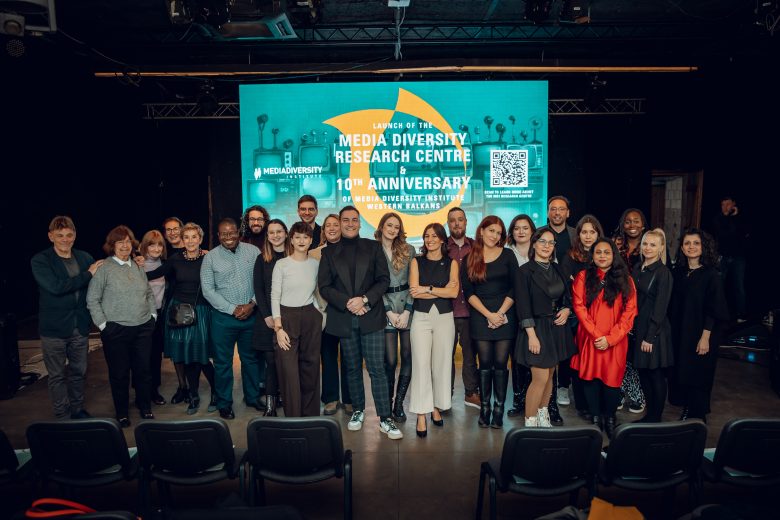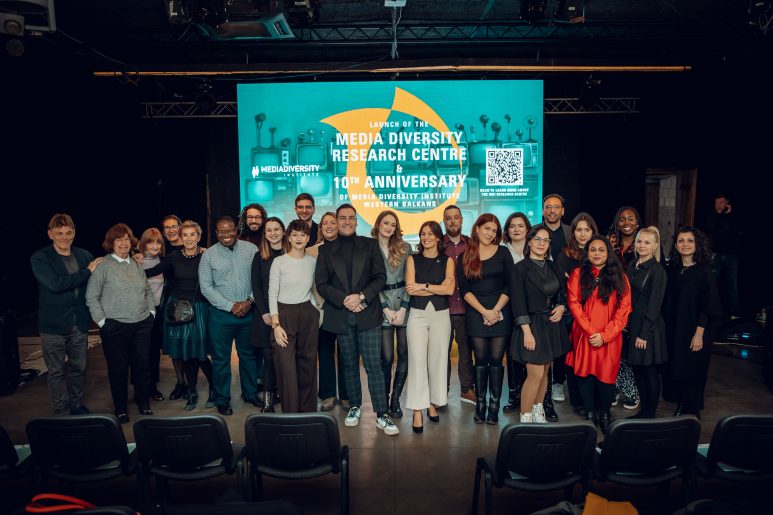On December 10th, International Human Rights Day, MDI launched its Media Diversity Research Center (MDRC) and marked the tenth anniversary of its sister organisation, MDI Western Balkans. The event, held in Belgrade, gathered more than 100 guests – media experts, journalists, civil society activists, journalism academics, policymakers, media development representatives, and the MDI team.
Media Diversity Research Center

Building on MDI’s more than 25-year legacy of promoting inclusive and accurate media representation, the MDRC was established to address the growing need for research at the intersection of diversity, inclusion, and public interest journalism. The goal of the MDRC is to provide a hub for innovation and knowledge sharing, support efforts to improve social cohesion through the media, equip journalists and media professionals with the tools to improve representation, and influence policy with empirical data on media diversity.
Opening the event, the MDI Executive Director, Milica Pesic, emphasised the importance of fair and inclusive media, as one of the basic principles of democracy. “We still see ourselves as facilitators of deliberative and inclusive debates around diversity in the media among different stakeholders – media, civil society, media educators, and policymakers. In today’s divided and polarised world, it’s a huge challenge to make all stakeholders, particularly those on the far left and far right, that inclusion of diversity matters.”
Dr Verica Rupar, the MDI Trustee, Professor of Journalism at Auckland University of Technology, New Zealand, and author of the first MDRC policy paper, addressed the audience by stressing the changes in the concept of diversity. “Diversity in media is no longer just about who speaks and controls the content, but about the complex interplay between media actors, content, audience engagement, and supporting social structures.”
Dr Naomi Sakr, Emeritus Professor of Media Policy, University of Westminster, UK, presented at the event, The Media Diversity Index she developed through the MDRC. “The Index, the first of its kind, is intended for use by stakeholders inside and outside the media industry as a benchmark for evaluating the performance of media outlets about diversity and inclusion.”
Dr Jovanka Matic, a media expert and a member of the MDRC Advisory Board presented the first pilot assessment of media and diversity activities in Serbia by designing a methodology to be used regionally and globally. “The pilot should provide policy-making actors in the government and the media with research results on the kinds of media narratives, discourse strategies, and journalistic practices that harm social cohesion and further increase exclusion of vulnerable population segments.
MDI Western Balkans is 10
Recalling the first 10 years of the MDI Western Balkans (MDI WB), its Executive Director Ivana Jelaca looked into the future: “The dream of no longer being needed is still a long way from being realised. Promoting diversity in the media and tackling hate speech remains challenging and vital work in the region.“ In her article about the challenges the region has been facing, Jelaca says, “We did get capitalism but not the democracy yet’ There is still a lot to do to ensure pluralism and diversity in the media.”
Jelaca discussed the increase in targeting of “the other”. “Be it women, queer people, ethnic or religious minority, or just someone who thinks differently. You could be targeted”, Jelaca quoted the findings done through the MDI / MDI WB project Reporting Diversity Network (RDN).
The panel ‘Gender Disinformation in the Western Balkan Region’ tackled the issue of the intertwining between hateful narratives targeting women and disinformation. One of the panellists, Despina Kovacheska, an RDN media monitor in North Macedonia, reminded of the severe consequences that this kind of narrative has for those targeted. Another panellist, Selma Fukelj, a media monitor in Bosnia and Herzegovina, analysed the media discourse around the recent case of femicide in BiH, exposing the harmfulness for the victims but also other people exposed to gender-based violence.
As part of its ongoing commitment to creating a space for young people and young journalists, and ensuring their voices are heard, MDI WB presented two awards. The MLADI award celebrated the best (multi)media content on the topic “The Role of Youth in Western Balkans”. The award is given for the fifth year in a row for the best (multi)media content produced by young people in Serbia. Viktor Uvalić, a highschool student at Sava Šumanoviš Gymnasium in Šid, Serbia, was the winner of the MLADI award.
This year, for the first time, MDI WB has opened a competition for the Regional award. Inspired by the MDI WB work in the field of intercultural dialogue, the award went for the best (multi)media content that problematises the “Media and Youth Identity in the Western Balkans”. The award winners are a talented team of young activists and journalists – Natalija Petrović, Ema Nikočević, Simona Paskovska, and Nađa Stojanović from four Western Balkans countries (Bosnia and Herzegovina, Montenegro, North Macedonia and Serbia respectively).
“I want every young person to remember this – our ideas hold the power to shape the future. But we are not just the future; we are more than that. We are the present, and change starts with us. It starts with us. It starts now” , said Nađa Stojanović. The event was hosted by the inspiring Marija Jovanovic, the MDI Western Balkans Communications Manager.

